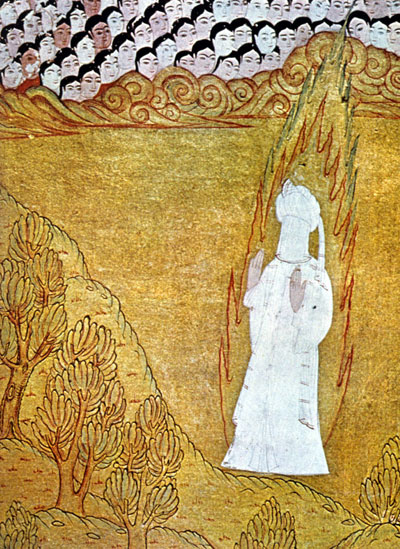 Dearest M,
Dearest M,
Everyone who knew you agrees about one thing. “He had a smile of incomparable charm,” writes one Western scholar. She’s going by accounts from written sources, descriptions used by your earliest biographers. Here’s how I see your smile for myself: Warm. Bright. But never the high-beam setting of a salesman or a politician.
Having grown up in a culture where it’s considered acceptable to manipulate the emotions of others, glad-handing one’s way to personal gain, for a long time I distrusted people who smiled. And I didn’t smile much myself. I spent substantial sums on dental work in my 20s mainly to pass muster among the corporate executives, art dealers and other posh people I wanted to be identified with. At that time, a smile for me was purely a class marker: an ID card flashed to establish my social bonafides. Only later, when I left that world, did I stop worrying so much about my working-class origins. It was when I came to this path that I felt my inherent worth as a human being. Then I could start smiling for genuine reasons: not to show off my corrected teeth, but because I felt loved for my essence, and because I could love others similarly.
I think you always had that capacity. You could see others in their wholeness and the potential of their being. Because you looked with the eyes of love, everywhere you looked you saw beauty.
I think you had the smile of a shy person. More often than not, it hovered at the corners of your mouth, the budding of your innate goodwill. It only needed the right set of conditions to burst into blossom.
The natural world always entranced you; birds in particular, whether hopping and pecking or taking to wing, were a source of wordless delight. And of course, you loved children. Adults, on the contrary, could make you smile when they acted childish. There’s that story of the woman who complained her husband scolded her for telling him he should make his ablutions again when he broke wind during prayer. Laughing (and, I imagine, shaking your head too), you told him his wife was right!
You smiled often with your closest companions and friends. But, I feel it would have been rare for you to have only smiled in their company: more often, you would have also taken their hand, or put an arm around their shoulders, or pressed your lips to their forehead. There was so much love inside you, it would quicken and leap up like wings of light to encircle anyone you touched.
That’s why anyone who was touched by you in that way, whether an intimate or a stranger, would remember it. They’d feel cleansed and expanded, swept free of the knots of pain and doubt inside. The biographers don’t say this directly either, only repeating those claims made on the basis of a sound chain of transmission that someone had been healed of a fever or found they were able to walk again.
What I see in my mind’s eye is the moment just after these encounters, as the light starts to dawn in their faces. All the old fears lift away. Their eyes become clear and wide as they look at you in wonder. Sometimes they grip your hand harder with an unspoken question. Your smile doesn’t get any brighter – you don’t give false assurances – but neither does it dim. It remains steady as you tell them what they have to do. All of them nod and make promises.
The ones who followed through would be the minority; you knew that too. Your smile could be pained. It was hard for you at times, feeling the intensity of people’s longing. Even when they weren’t thronging you in crowds or lining up as petitioners, even when you went away by yourself in the depths of night, their torment would reach you. You could hear the servant girl whispering into the frayed mat she curled up on as well as the wealthy merchants muttering on their cushioned divans.
That’s when Jibreel was such a comfort. Slipping out of the house, you’d make your way through the cemetery and up to the rocky hill by moonlight. There you’d feel his immense presence surround you and hear the ring of his voice like a bell in your ear: It is not for you to do more than tell them, he would remind you.
Looking out at the city of Medina spread below, the homes of the Muslims arranged in rows as neat as the lines they prayed in, you would sigh to Jibreel: Is there nothing more I can do?
His reply would be immediate: You came only as a warner.
In the wake of his departure, the air would vibrate and your ears would still have the feeling of openness that came with each message. Afterwards, you would sway for a while in the ripples that lingered after his appearance, breathing with the night’s stillness.
Often enough, your heart was heavy with the things you had seen and heard, and with the burden of what you had been given. (Indeed, as we’re told, had the Qur’an been imparted to a mountain, it would have crumbled under its weight.) Yet nothing could dim your own inner light and lightness. In a moment, remembering the beauty and compassion of the Most Generous could bring your smile forth again… a smile that was a reflection of those same qualities of the Divine for anyone who saw it.
Sitting with my knee pressed to yours, watching the little sparrows that were your favorites,
Anna
Read Love Letters to Muhammad (1 of 11)
Read Love Letters to Muhammad (2 of 11)
Read Love Letters to Muhammad (3 of 11)
Read Love Letters to Muhammad (4 of 11)

